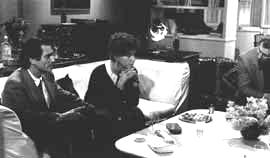 |
 |
 |
|
 |
|
| SYNOPSIS |  |
|
Victor, a successful political journalist, married to a doctor called Martha, falls in love
with and is loved by Anna, his wife's best friend. After some hesitation the two lovers give
in to their passion and make love. Martha, desperately wounded and humiliated by this act of
(double) betrayal decides to go away to Africa. Several years later she comes back home and
meets Anna who is now seriously ill. After years of estrangement and unexpressed resentment,
the two women rediscover their one-time friendship, and the act of treason, perpetrated by
Anna with Victor as her accomplice, seems so unimportant now that two people manage to
explain themselves, understand each other and make peace. Thus, passion, inner strife,
accentuated by deep suffering and remorse, are put aside and buried forever. This film is
a tangle of feeling, of continual, real and imaginary conflict, of passion and jealousy,
of love and hate, of irrationality and reason.

|
| Margarette Von Trotta |  |
|
|
Born February 21, 1942, grew up in Düsseldorf. Worked in an office and then went to Paris, where she gained her first experiences with film. Acted in some shorts, returned to Germany in the early 60s, finished High School (Abitur), started a degree in Fine Arts. Studied German and Romance languages in Paris and Munich and attended the drama school in Munich.
Worked as an actress, starting in 1965 at the Stuttgart Theatre. In 1969, she met Volker Schlöndorff, married in 1971. She became one the most famous actresses of the New German Film in the following years. Starred in movies by Herbert Achternbusch, Rainhard Hauff, and Rainer Werner Fassbinder.
In 1970, she began writing screenplays. In the same year, she worked for the first time as a director (with Volker Schlöndorff, Der plötzliche Reichtum der armen Leute von Kronbach). She became famous as a director in 1975, when she co-directed The Lost Honour of Katharina Blum with Schlöndorff. The Second Awakening of Christa Klages (1977) was the first movie she directed by herself. In 1979, she made Sisters or the Balance of Happiness
In 1981, she gained international success with Die bleierne Zeit (The German Sisters or Marianne and Juliane). In 1985, she made a film about Rosa Luxemburg with Barbara Sukowa in the title role. In 1989, von Trotta took part in the co-production Felix (with other renowned German women filmmakers Helke Sander, Helma Sanders-Brahms, and Christel Buschmann). She is separated from V. Schlöndorff and lives in Paris.
Her most recent feature film, The Promise (1994) has been critically acclaimed.
|
|
|
|
